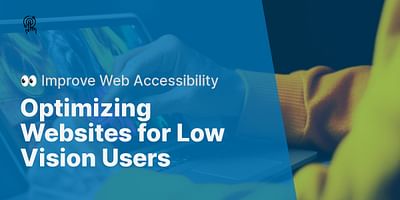Alessandra is a proficient software developer with a burning passion for creating user-friendly technology specifically designed for individuals with disabilities. She possesses extensive experience working on projects that utilize machine learning to enhance accessibility. Alessandra continually seeks innovative approaches to make technology a more inclusive space.
As a software engineer who is passionate about creating accessible technology for people with disabilities, I understand the importance of avoiding stereotypes. Stereotypes can perpetuate misconceptions and hinder the progress towards inclusivity and equality for individuals with disabilities. In this answer, I will explain why it is crucial to avoid stereotypes about people with disabilities and how it can positively impact our society.
First and foremost, avoiding stereotypes is essential because it respects the dignity and individuality of people with disabilities. Each person is unique, with their own strengths, abilities, and aspirations. Stereotypes often oversimplify and generalize the experiences of individuals with disabilities, disregarding their diverse talents and potential contributions to society. By avoiding stereotypes, we recognize and honor the inherent value and worth of every person, regardless of their abilities.
Furthermore, stereotypes can lead to discrimination and exclusion. When we rely on preconceived notions about people with disabilities, we limit their opportunities and deny them equal access to education, employment, and social participation. Stereotypes can create barriers that prevent individuals with disabilities from fully engaging in society, perpetuating a cycle of inequality. By challenging and avoiding stereotypes, we can promote a more inclusive and accessible society that embraces diversity and provides equal opportunities for all.
Avoiding stereotypes also fosters empathy and understanding. Stereotypes often stem from a lack of knowledge and familiarity with disabilities. By actively seeking accurate information and engaging in conversations with individuals with disabilities, we can challenge our own biases and develop a deeper understanding of their experiences. This empathy allows us to build meaningful connections and work together to create a more inclusive world.
In addition, avoiding stereotypes promotes innovation and creativity in the field of assistive technology. When we break free from stereotypes, we open ourselves up to new perspectives and ideas. By recognizing the unique needs and abilities of individuals with disabilities, we can develop innovative solutions that empower them to fully participate in all aspects of life. By avoiding stereotypes, we can create technology that truly meets the diverse needs of individuals with disabilities, enhancing their independence and quality of life.
Lastly, avoiding stereotypes contributes to a more positive and inclusive narrative surrounding disabilities. Stereotypes often perpetuate negative assumptions and portray people with disabilities as helpless or burdensome. By challenging these stereotypes, we can shift the narrative towards one that celebrates the strengths, resilience, and achievements of individuals with disabilities. This positive representation not only benefits individuals with disabilities but also helps to change societal attitudes and perceptions.
In conclusion, avoiding stereotypes about people with disabilities is crucial for several reasons. It respects the dignity and individuality of individuals with disabilities, promotes equality and inclusion, fosters empathy and understanding, drives innovation in assistive technology, and contributes to a more positive and inclusive narrative. By challenging stereotypes, we can create a society that values and embraces the diverse abilities and contributions of all individuals, regardless of disability.















